Farm “take it to feed it”
Before our eyes a casually dressed man in working clothes appeared. He is busy repairing the manual plow that is still used in mountainous areas. Unexpectedly, it was the owner of Khe Sanh Valley Farm, a famous farm in western Quang Tri.
Khe Sanh Valley Farm is temporarily closed to welcome guests who are renovating the landscape and repairing farm machinery.
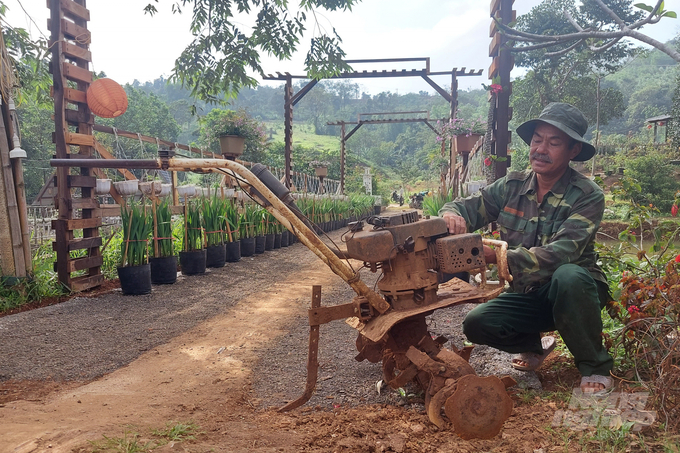
Farmer Ho Van Hinh on the farm left nothing. Picture: From crap.
Mr. Ho Van Hinh, a former businessman, returned to “hidden” many years ago. In Block 1, Khe Sanh Town, Huong Hoa District (Quang Tri Province), in addition to 3.5 ha of available agricultural land, Mr. Hinh bought more and built a farm of 7 ha.
In this area of basalt red soil, his family previously planted all kinds of trees such as coffee, fruit trees, cassava, sugar cane … These crops brought quite a lot of income, but there were also many years of failure due to high prices, irregular ups and downs.
When building Khe Sanh Valley Farm, he planted more jackfruit, orange, grapefruit, sapodilla, coconut, banana on the upper floor and pineapple, cloves, cassava on the lower floors… Each species of tree lives on different floors, creating a carpet system. Abundant crops for agriculture. Light-loving plants grow upwards, shade-loving plants grow downwards. At first glance they seem to compete with each other, but in fact they live very harmoniously together.
But the devastating floods in 2020 meant that all newly planted trees were almost completely destroyed. His whole family worked hard to clean, renovate and use machinery to redesign the site to continue planting trees. Unlike last time, Mr. Hinh blocked the creek at the farm to form 5 fish ponds. The source of the spring water flowing down from above is partly regulated into the pond, partly divided into tributaries to serve for irrigating the crops.
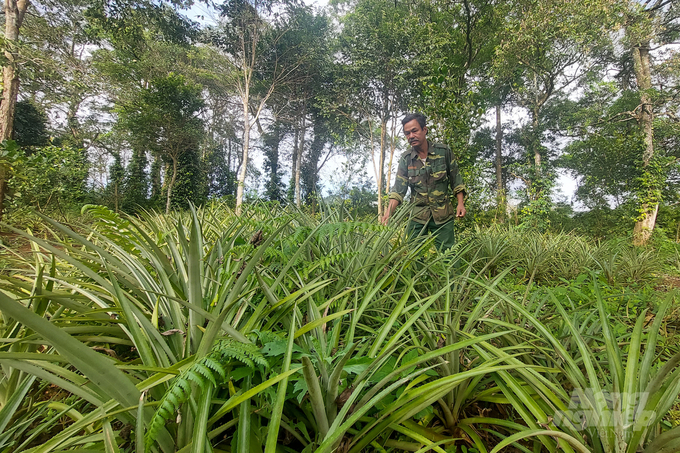
A multi-layered canopy forest is gradually forming at Khe Sanh Valley Farm. Picture: From crap.
The amount of nutrients provided to the plants at Khe Sanh Valley Farm is derived from pig manure that is composted with microbial products and agricultural by-products. Each species of tree in Khe Sanh Valley Farm also helps the owner of this farm to improve the land, in addition to the value of generating income as agricultural products.
For example, at the end of the time when beautiful flowers serve the needs of visitors, sunflowers will harvest seeds and be bought by visitors to the garden; The stems and leaves are chopped to create porosity for the soil. The weeds, fish and pigs that don’t eat are composted by the owner to fertilize the plants… Just like that, nothing has to be thrown away on this farm.
Fish ponds only eat natural grass from the hills, banana leaves and agricultural by-products. But just raising fish for sale, the profit is not big, Mr. Hinh thought of offering fishing services. There were days when the fisherman was so crowded that he had to stop serving.
“If fish is farmed for sale, 1.2 ha of this water area can at most generate profit of VND 60 million per year. But I’ve bought 100 sets of fishing rods, averaged 100 visitors a day, made millions arithmetically, not to mention accompanying services like water sales and food. If I don’t believe that, the value of aquaculture land isn’t worth much,” Hinh shared.
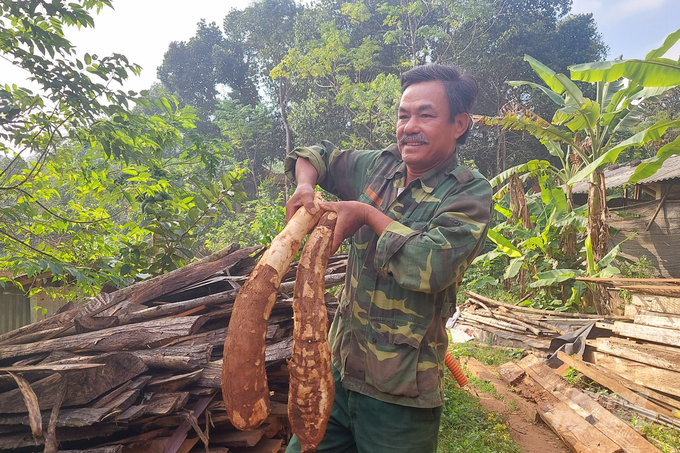
The agricultural products of Khe Sanh Valley Farm are used on the farm and are almost not directly sold to the outside. Photo: From crap.
Mr. Hinh stopped under the jackfruit trees, where there were many green jackfruits weighing up to 10 kilograms, and said, “This jackfruit and cassava I use to raise wild boar, not to cook or ferment anything. These cassava roots weigh up to 5-6 kg, when sold to the cassava factory they don’t get much, but when they feed the pigs they get a very tasty pork product that the customers love and sometimes approach. 200,000 VND/kg steam”.
Don’t sell anything
The special thing is that the Khe Sanh Valley Farm doesn’t do without anything, but also sells almost nothing. That’s a choice.
“This farm doesn’t have to buy anything from outside either, including necessities and fertilizers for the crops. Pineapples are too ripe to sell a few lately, but most are sold on the spot. Given the beautiful scenery, many guests come here, bring the whole family, go fishing, visit experiences. You have needs, we also serve food. Many people find the fruit beautiful and tasty, after trying it, they pick it themselves, and then load it. So we just take care of the production without having to go to the market to sell,” Hinh shared.
Mr. Hinh selects crops with few pests and diseases and sprays only home-made medicines on the farm without using any pesticides and chemical fertilizers.
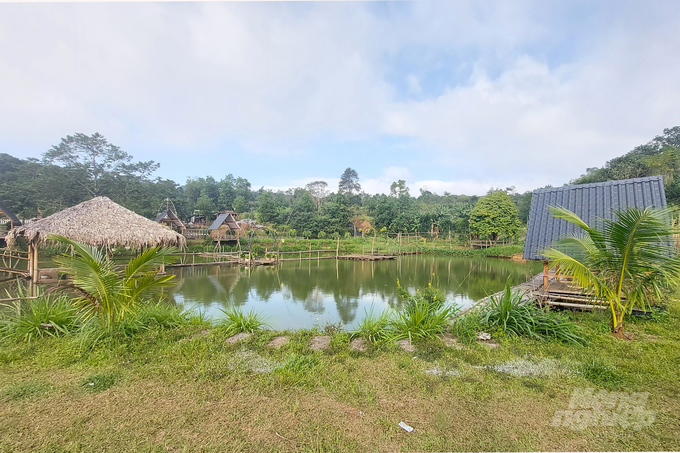
The conversion of fish ponds into recreational fishing services not only creates a livable landscape, but also brings a great source of income for Khe Sanh Valley Farm. Picture: From crap.
“In the past, many types of crops were grown and there were many pests, so they had to use pesticides. I find it too toxic, now I don’t dare to use it anymore, just use homemade herbal medicine. Such farming requires more effort, but in return there is much more serenity and a sense of health,” said Mr. Hinh.
No formal training in agricultural production, but through books and newspapers and self-created experience, Mr. Hinh realized that chemical nitrogen fertilizers are just like temporary tonics to help plants grow quickly. However, the downside of chemical fertilizers is that they make the soil harder and harder, only a temporary value that makes many beneficial soil microorganisms disappear. In fact, using organic fertilizers directly on the self-composting farm has helped soil layers be more porous and plants grow more sustainably.
“I used to grow coffee and also bought a machine to peel coffee and use it as fertilizer. But back then, a lot of chemical drugs were used in coffee growing, so I had to go to the emergency room several times for poisoning, so I shudder now when I think about it,” recalls Mr. Hinh.
Mr. Hinh’s family has 6 main workers who currently focus on production at the farm. On days with guests, his family had to hire more cooks and waiters. When it comes to harvesting fruit trees in the garden to preserve them or planting flowers for landscaping, Mr. Hinh’s family hires more than 10 workers. Most workers at Khe Sanh Valley Farm belong to the local Pako Van Kieu ethnic group.
We were wondering why products like bananas, jackfruits… are wasted in pig feeding, Mr. Hinh thought for a while and then said it was also the family’s concern.
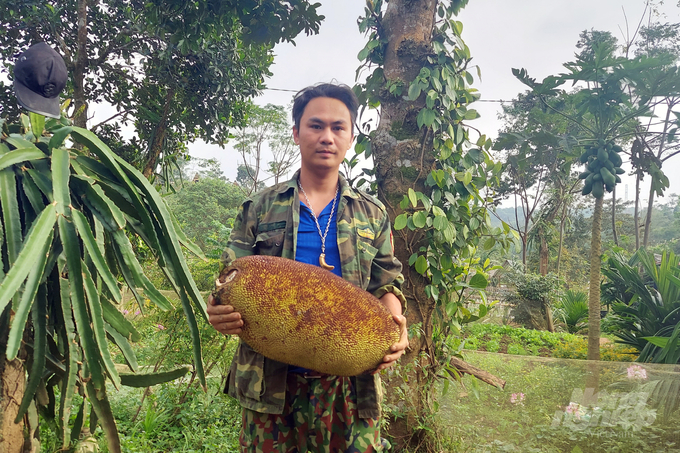
Choosing its own path, Khe Sanh Valley Farm transforms the farm products here into processed products that serve as an experience for guests. Picture: From crap.
“In farming, if you borrow money from a bank and at the same time pay out money, it is easy to fail, you can work, learn from experience and hope to be successful in the long term. I have many other plans, such as processing jackfruit and bananas into dried products and only serving visitors here. In addition, we will plant more medicinal plants under the treetops to increase income. But that’s the story of tomorrow, the day after tomorrow, and now every step you take is counted,” explained Mr Hinh.
Hinh’s daughter, Ho Thi Phuong, opened a coffee shop after graduating in tourism and joined the Khe Sanh Coffee Cooperative. At that time, Phuong collected every salary every month to focus on buying seedlings to be planted on the farm. After the farm found a source of income with more and more work, Phuong quit her job to help Mr. Hinh with farming. Phuong wants to take advantage of the climate and soil in this country so that agricultural products become tourism products, the farm will be a destination for tourists to experience.
“In the last few seasons, when the flowers were blooming in the yard, many groups of guests, children from local schools, came here to experience something. I want to build Khe Sanh Valley Farm to become a destination in West Quang Tri – Bac Huong Hoa adventure tourism chain. Khe Sanh Valley Farm will become a multi-layered forest canopy with rich flora and pristine scenery for people to come here to find a sense of relaxation,” Phuong confided.
“If you keep monoculture, farmers can very easily ‘fall behind’ during this period because there are no crops with stable prices for a long time. I am a multi-cultivator, this one loses and the other one makes up for it. And the most important thing is if it’s too cheap I can’t sell it but I can still use it for other purposes right on this farm. It is not easy to create a farm with our own ideas, but we are gradually approaching the finish line,” said Mr. Ho Van Hinh.

